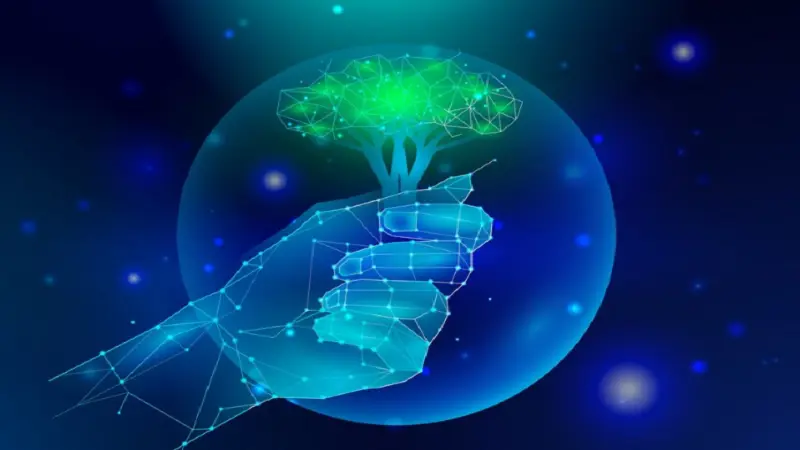Artificial Intelligence (AI) is rapidly transforming how we live, work, and interact with the environment. Many are asking, Is AI a Boon or a Bane? Understanding AI’s impact on sustainable development is crucial for tech enthusiasts, AI users, and businesses.
This blog explores whether AI is a blessing or a curse in the quest for sustainability and offers insights for those eager to harness its potential responsibly.
Defining AI and Sustainable Development
AI refers to machines and systems designed to mimic human intelligence. It includes machine learning, natural language processing, and robotics. Sustainable development, on the other hand, aims to balance economic growth with environmental protection and social equity. Combining these two fields can yield robust solutions but also pose significant challenges.
How AI Fuels Economic Growth
One undeniable benefit of AI is its potential to boost economic growth. Businesses use AI to automate tasks, optimize operations, and enhance decision-making processes. For instance, AI-driven analytics help companies predict market trends and consumer behavior, leading to more informed strategies and increased profits.
However, with great power comes great responsibility. Unchecked economic growth fueled by AI could exacerbate inequalities and overlook environmental concerns.
AI in Environmental Monitoring and Management
AI’s ability to quickly process vast amounts of data makes it a valuable tool in environmental monitoring. For example, AI algorithms analyze satellite images to track deforestation, monitor wildlife populations, and predict weather patterns.
These applications help governments and organizations implement more effective conservation strategies and respond promptly to environmental changes. Yet, relying heavily on AI for ecological management can lead to overconfidence in technology, potentially ignoring the need for human judgment and intervention.
Social Equity and AI
While AI holds promise for enhancing social equity, it also raises concerns. AI can improve access to education and healthcare by personalizing learning experiences and predicting health outcomes. However, AI systems can perpetuate existing biases if they rely on flawed data.
Businesses and developers must commit to creating inclusive AI that recognizes and addresses these biases, ensuring that technology benefits everyone, not just a privileged few.
Ethical Considerations in AI Development
AI’s impact on sustainable development hinges on ethical considerations. Developers and businesses must prioritize transparency, accountability, and fairness in AI systems. This is where leveraging the business blueprint AI advantage comes into play, helping companies align their AI strategies with ethical guidelines. By actively engaging with stakeholders and addressing societal concerns, the tech community can develop AI solutions that support sustainable development goals through dialogue and collaboration.
AI in Energy Efficiency
AI’s role in improving energy efficiency is another potential boon for sustainable development. AI systems optimize energy consumption in buildings, manage power grids more effectively, and aid in developing renewable energy sources.
For instance, AI algorithms can predict energy demand and adjust supply accordingly, reducing waste and lowering costs. However, AI’s energy consumption, particularly in data centers, poses a paradox requiring a careful balance to achieve true sustainability.
The Risk of Technological Unemployment
While AI drives efficiency and innovation, it also threatens job security. Automation can potentially displace workers in various industries, creating economic instability and social unrest. To mitigate these risks, businesses and policymakers must invest in reskilling and upskilling programs. Preparing the workforce for an AI-driven economy is essential to ensuring that technological advancements contribute positively to sustainable development.
Case Studies of AI in Action
Several case studies highlight AI’s potential to support sustainable development. For example, AI-powered platforms are used to design sustainable urban infrastructure, optimize agricultural practices, and even reduce food waste.
These examples demonstrate that AI can be a powerful ally in achieving sustainability goals when applied thoughtfully. Yet, these successes require continuous evaluation and adaptation to avoid unintended consequences.
AI and the Circular Economy
The circular economy model, which emphasizes resource efficiency and waste reduction, aligns well with AI technologies. AI can facilitate the transition to a circular economy by optimizing supply chains, predicting resource needs, and enhancing recycling processes.
Businesses that adopt circular economy principles supported by AI can achieve greater sustainability while maintaining profitability.
The Role of Governments and Policymakers
Governments and policymakers are critical in shaping AI’s contribution to sustainable development. By establishing regulations and standards that promote ethical AI use, they can ensure that technology serves the public good.
Collaborating with technology companies, researchers, and civil society can help create a framework that balances innovation with sustainability.
The Importance of International Cooperation
Sustainable development is a global challenge that requires international cooperation. AI can facilitate cross-border collaboration by enabling data sharing and knowledge exchange. Countries can leverage AI to address shared challenges such as climate change, resource scarcity, and social inequality by working together. However, this requires mutual trust and commitment to equitable data governance.
Building a Sustainable AI Future
For tech enthusiasts, AI users, and businesses, the path forward involves recognizing AI’s dual nature as both a blessing and a curse for sustainable development. By prioritizing ethical considerations, investing in education and workforce development, and fostering international cooperation, we can harness AI’s potential for good.
The future of AI and sustainability depends on our collective ability to innovate responsibly and inclusively.
Final Thoughts
In conclusion, artificial intelligence offers immense opportunities for sustainable development but also presents significant challenges. By addressing these challenges thoughtfully and collaboratively, we can ensure that AI acts as a force for positive change. For those interested in learning more about responsible AI use, consider exploring further resources and joining the conversation on how to build a sustainable AI future.
